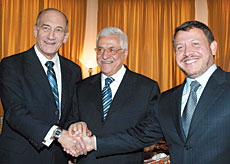AMMAN/GAZA CITY, 23 June 2006 — Israeli Prime Minister Ehud Olmert told Palestinian President Mahmoud Abbas yesterday that he regretted the deaths of 14 bystanders killed in recent Israeli airstrikes in the Gaza Strip.
But Olmert, in his first, informal face-to-face meeting with Abbas at a conference in Jordan, stopped short of apologizing for civilian deaths that have drawn international censure of Israel’s response to rocket attacks from Palestinians in Gaza.
“I feel a deep regret over the death of innocents, but there is no moral equivalence between Palestinian attacks on Israel and Israeli army operations, because the army does not intend to hurt innocents,” a source in Olmert’s office quoted him as telling Abbas on the sidelines of the talks in the ancient city of Petra.
Abbas said that joint Palestinian-Israeli teams would meet next week to pave the ground for his first formal talks with Olmert since he became prime minister of Israel early in May. He said the date and venue of his meeting with Olmert would be decided “in the light of the outcome of the meetings of these technical panels.” However, a Palestinian official accompanying Abbas said he expected the meeting between the two leaders to take place in “the coming two weeks either in Jordan or Egypt.”
Abbas was speaking to reporters after his talks with Olmert and Jordan’s King Abdallah. During the meeting, Abdallah urged both leaders to take steps to “reinvigorate” the stalled Middle East peace process and underscored the importance of confidence-building measures on both sides as a prelude to resuming peace negotiations, according to a royal court statement. He “warned against any fresh military escalation that could lead to a complete derailment of peace efforts between the Palestinians and Israelis.”
Alluding to Olmert’s unilateral withdrawal plan from the West Bank, the Jordanian leader called on both sides to adhere to the road map that was worked out three years ago by the Middle East Quartet comprising the United States, the European Union, Russia and the United Nations. “The road map represents the only realistic formula for reaching an agreement on a viable and independent Palestinian state that lives in peace with Israel,” the king told Olmert and Abbas.
During a panel discussion after their meeting, Olmert said he was ready to give up some occupied land to make way for a Palestinian state but would not accept withdrawal to Israel’s pre-1967 borders as demanded by the Palestinians. “I am ready to make compromises and pull out of territory, something you would not expect an Israeli prime minister to say in an Arab country openly and publicly,” Olmert said.
“I have no commitment to return back to the boundaries that are defined by Abu Mazen or other Palestinians,” he said. “There will be blocks of settlements that will remain, that cannot be evacuated, but there will be many, many parts of the territory... evacuated by Israel, and contiguous territory where the Palestinians will be able to realize their life-long dream of building their independent state.”
In a statement, Hamas said Abbas should not have met Olmert and criticized Jordan for accepting the visit when it had refused to meet new Cabinet ministers from the group’s own government.
— Additional input from agencies


